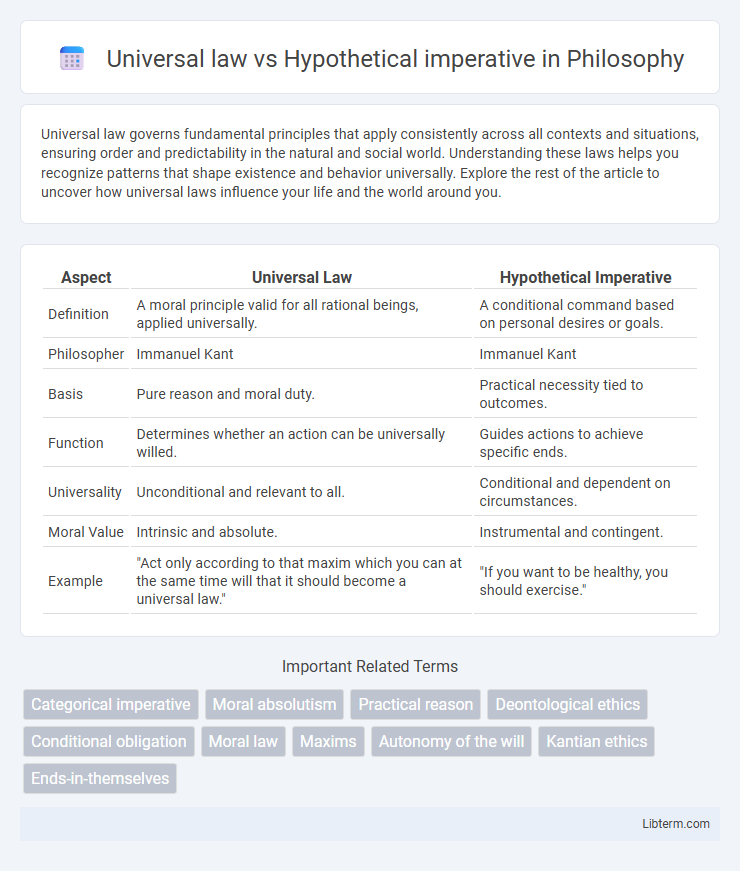Universal law governs fundamental principles that apply consistently across all contexts and situations, ensuring order and predictability in the natural and social world. Understanding these laws helps you recognize patterns that shape existence and behavior universally. Explore the rest of the article to uncover how universal laws influence your life and the world around you.
Table of Comparison
| Aspect | Universal Law | Hypothetical Imperative |
|---|---|---|
| Definition | A moral principle valid for all rational beings, applied universally. | A conditional command based on personal desires or goals. |
| Philosopher | Immanuel Kant | Immanuel Kant |
| Basis | Pure reason and moral duty. | Practical necessity tied to outcomes. |
| Function | Determines whether an action can be universally willed. | Guides actions to achieve specific ends. |
| Universality | Unconditional and relevant to all. | Conditional and dependent on circumstances. |
| Moral Value | Intrinsic and absolute. | Instrumental and contingent. |
| Example | "Act only according to that maxim which you can at the same time will that it should become a universal law." | "If you want to be healthy, you should exercise." |
Understanding Universal Laws: Definition and Origins
Universal laws, rooted in Kantian philosophy, are ethical principles that apply universally and unconditionally, guiding moral actions irrespective of individual desires. These laws originate from reason and serve as foundational maxims that individuals must follow to achieve moral duty and autonomy. Contrasting with hypothetical imperatives, which depend on personal goals or contingent outcomes, universal laws embody objective necessity, representing duties valid for all rational beings.
The Concept of Hypothetical Imperatives Explained
Hypothetical imperatives are conditional commands that prescribe actions based on desired outcomes or goals, such as "If you want to stay healthy, exercise regularly." These imperatives contrast with universal laws, which are unconditional moral rules applying universally regardless of individual desires. Kantian philosophy emphasizes that while hypothetical imperatives depend on subjective aims, universal laws derive from reason and hold absolute ethical authority.
Immanuel Kant’s Moral Philosophy: An Overview
Immanuel Kant's moral philosophy distinguishes the universal law from the hypothetical imperative by emphasizing categorical imperatives, which command actions as universally necessary regardless of personal desires. The universal law requires individuals to act only according to maxims that could be consistently willed as a universal law, ensuring objectivity and moral duty. In contrast, hypothetical imperatives are conditional commands dependent on specific goals, lacking the absolute moral authority found in Kant's concept of universal laws.
Universal Law: Foundation of the Categorical Imperative
The Universal Law serves as the cornerstone of Immanuel Kant's Categorical Imperative, mandating that moral actions must be applicable as a universal principle without contradiction. This foundation requires individuals to act only according to maxims that can be consistently willed as a law for all rational beings, ensuring objective morality. In contrast to hypothetical imperatives, which depend on personal desires, the Universal Law emphasizes duty grounded in reason and impartiality.
How Hypothetical Imperatives Guide Conditional Actions
Hypothetical imperatives direct actions based on specific conditions and desired outcomes, serving as practical rules contingent on individual goals. Unlike universal laws, which prescribe actions universally irrespective of circumstances, hypothetical imperatives depend on the agent's objectives, such as "If you want to stay healthy, then exercise regularly." These conditional directives optimize decision-making by aligning behavior with situational purposes and personal intentions.
Key Differences Between Universal Law and Hypothetical Imperative
Universal law refers to a moral principle that applies universally and unconditionally, guiding actions regardless of personal desires or outcomes. Hypothetical imperative is a conditional command that applies only if one has a specific goal or desire, directing actions based on contingent circumstances. The key difference lies in universality and necessity: universal law demands unconditional adherence, while hypothetical imperative depends on individual intentions and goals.
Real-life Examples of Universal Law in Ethics
Universal law, rooted in Immanuel Kant's categorical imperative, demands actions be universally applicable, such as telling the truth regardless of circumstances, promoting consistent ethical behavior. Hypothetical imperatives depend on specific desires or goals, like studying to pass an exam, lacking universal moral obligation. Real-life examples of universal law in ethics include prohibitions against lying or stealing, which maintain social trust and justice across diverse cultures and situations.
Applications of Hypothetical Imperatives in Daily Decision-making
Hypothetical imperatives guide decision-making by suggesting actions based on desired outcomes, such as choosing to study to achieve academic success or saving money to afford future expenses. In daily life, these imperatives apply to practical scenarios like setting goals, planning tasks, and responding to contingencies, where actions depend on personal or external objectives. This contrasts with universal laws that demand actions regardless of individual desires, emphasizing the role of hypothetical imperatives in conditional and instrumental reasoning.
Debates and Criticisms: Universal Law vs. Hypothetical Imperative
Debates around Kantian ethics often center on the tension between the Universal Law, which demands actions be inherently applicable as a universal norm, and Hypothetical Imperatives, which are conditional and goal-oriented. Critics argue the Universal Law's rigid formality overlooks contextual nuances, while Hypothetical Imperatives are challenged for lacking absolute moral authority and risking relativism. Philosophers such as H. J. Paton and Onora O'Neill have explored these complexities, questioning whether universalizability sufficiently captures moral obligation or if hypothetical reasoning better accommodates practical decision-making.
The Relevance of Kantian Ethics in Modern Society
Kantian ethics, particularly the universal law and hypothetical imperative, remains crucial in modern society by emphasizing moral duties based on principles that apply universally rather than contingent desires. The universal law demands actions be guided by maxims that can be consistently willed as universal laws, promoting fairness and justice in social and legal frameworks. In contrast, hypothetical imperatives, which depend on subjective goals, highlight the limitations of consequentialist ethics in addressing moral obligations, reinforcing Kant's focus on duty and respect for persons in contemporary ethical decision-making.
Universal law Infographic

 libterm.com
libterm.com